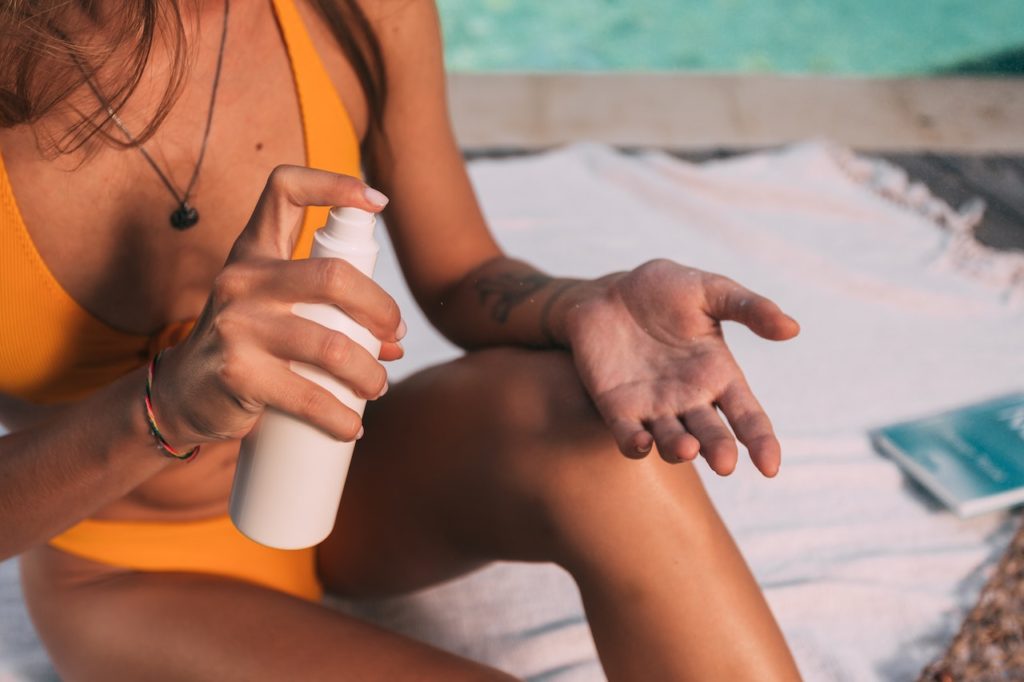A few weeks ago, I learned an interesting fact from a patient that I felt compelled to share. You might be just as shocked as I was thinking that this common practice was harmless, only to find out it’s actually terrible for your health.
What is this thing I am referring to? Well it is something that many folks do to improve the appearance of their skin tone using a method that doesn’t require excessive exposure to the sun or using a tanning bed for obvious reasons. You guessed it, it’s spray tanning!
I admit after learning this I had to test the waters to see if I was the only one oblivious. I asked several of my other patients and even my other practitioner colleagues who regularly tan themselves using self tanning products. They too had never heard of these spray tanning health risks. Most of them considered spray tanning safe and never thought it could have serious side effects.
You can read more research on spray tanning yourself but I wanted to point out some of the key points that significantly stood out to me as a functional medicine specialist and medical weight loss health provider (learn what medical weight loss means here).
How Spray Tans Work
Getting a spray tan is the easiest and safest way to get a beautiful faux glow, providing an even skin color that lasts for weeks. Compared to other types of sunless tanning products, such as tanning lotions or gels, sunless tanning sprays offer an easier application process and better results. All spray tanning products contain the same active ingredient called dihydroxyacetone (DHA) – a three carbon sugar. When applied to the skin, DHA reacts to and binds with amino acids and proteins in the dead skin cells on the outermost layer of the skin, giving the illusion of a tan (The “Maillard reaction”).
The chemical mimics high fructose corn syrup in that it causes a spike in the glycemic index leading to a cascade of metabolic events that stresses the body’s metabolism. As a medical weight loss provider I understand the negative impact this has given that nearly 1 in 3 adults in the US are overweight.
The HEALTH Risks associated with Dihydroxyacetone (DHA) use
The chemical mimics high fructose corn syrup in that it causes a spike in the glycemic index leading to a cascade of metabolic events that stresses the body’s metabolism. As a medical weight loss provider, I understand the negative impact this has given that nearly 1 in 3 adults in the US are overweight. Spray tanning is associated with:
- Insulin resistance – the precursor to type 2 diabetes mellitus and a condition that leads to weight gain and obesity.
- Mitochondrial dysfunction – the mitochondria’s main role is to create energy (or ATP) from the food we eat. In other words it is the engine behind our metabolism.
- Increased oxidative stress – oxidative stress is a condition that occurs when antioxidants in the body are depleted. This condition leads to a number of health problems such as infections or even cancer.
Some researchers also expressed concern that repeated inhalation of DHA from spray tanning solutions is known to cause allergic reactions, eye irritation, asthma or even pulmonary diseases.
Spray Tanning versus Real Sun Tanning and Tanning Beds
Sun tanning can help you look younger, but it can also cause a lot of harm to your body. Excessive sun exposure can cause severe burns and damage skin cells’ DNA, which are associated with an increased risk for sun induced skin cancers. The Skin Cancer Foundation and the American Cancer Society both recommend fake tanning as a safer alternative to real sun tanning. But if you don’t like fake tan and choose to expose yourself to UV rays, using a sunscreen can help prevent sunburn or skin rashes.
Tanning beds are also a great way to get a beautiful tan. Moderate exposure to UV radiation has some benefits: it reduces depression, it improves blood circulation, and it enhances vitamin D production, which supports bone strength. However, studies suggest it’s important to approach this type of sunless tanning with caution, as UV rays exposure could cause premature aging or even skin cancer.
Conclusion
I think we can all agree that people deserve to be aware of what’s in their products and all the things outside of just diet and exercise that could be a negative force against any efforts to improve health. I’m biased after spending nearly 10 years working in acute and critical care and seeing patients developing skin cancer and being so chronically ill that nothing could be done to reverse their various diseases. I feel blessed to be a functional medicine specialist where I’m now in a position to help people discover the root causes of their health challenges and to support true health and healing.
We are a better community when we offer information that is helpful to others so please share this article with someone you care about.
Sincerely,
Your Health Partner….Salimah
Dr. Salimah Jones, DNP, APRN, FNP-C
Functional Health Nurse Practitioner
Elevated Concierge Hydration and Wellness PLLC

